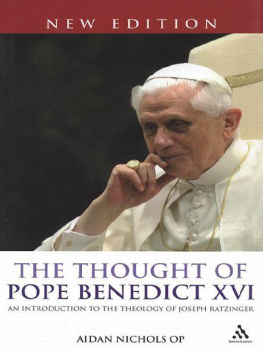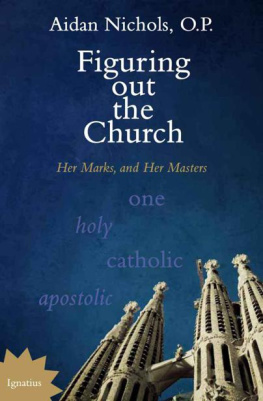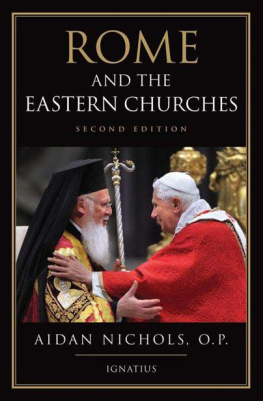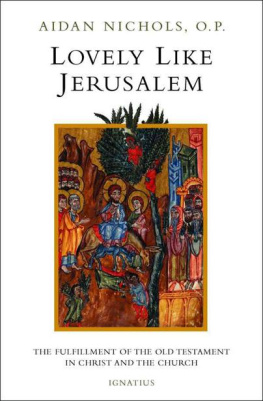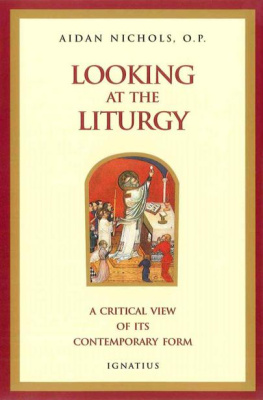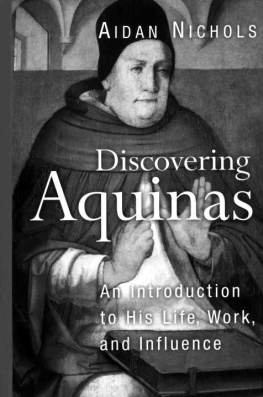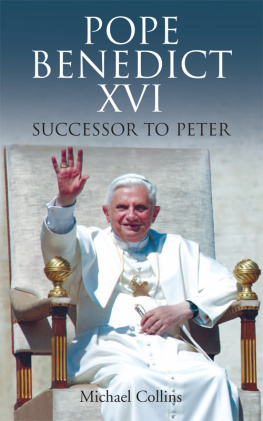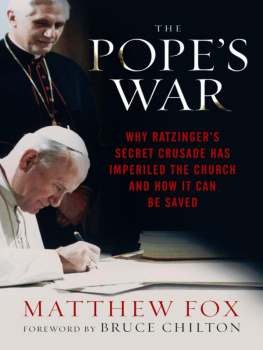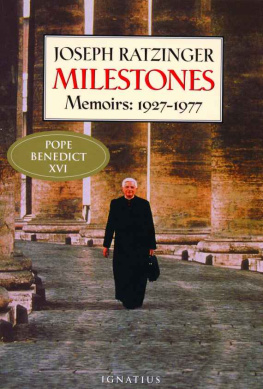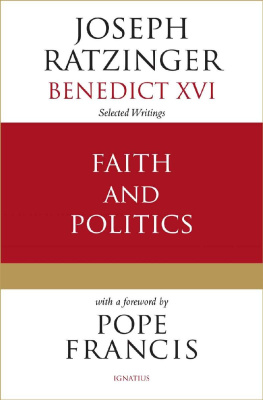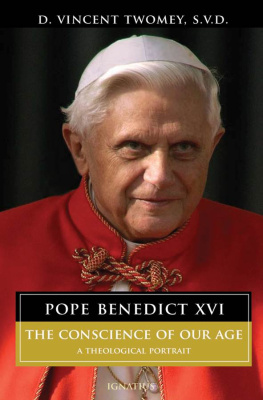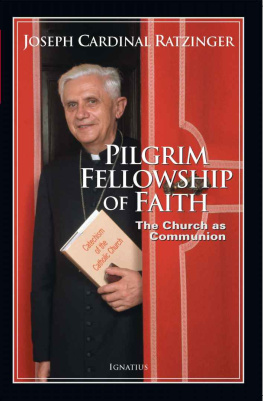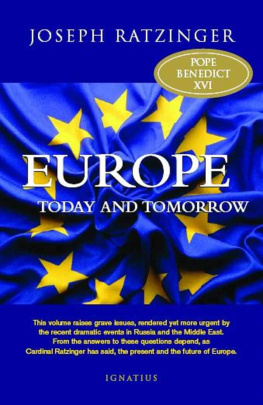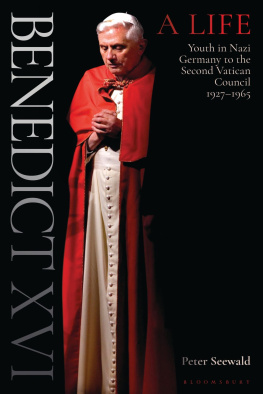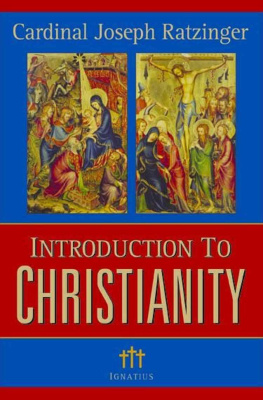The Thought of Pope Benedict XVI
New Edition
The Thought of
Pope Benedict XVI
New Edition
An Introduction to the Theology of
Joseph Ratzinger
by
Aidan Nichols OP

Published by Burns & Oates
A Continuum imprint
The Tower Building, 11 York Road, London SE1 7NX
80 Maiden Lane, Suite 704, New York, NY 10038
www.continuumbooks.com
All rights reserved. No part of this publication may be reproduced or transmitted in any form or by any means, electronic or mechanical, including photocopying, recording, or any information storage or retrieval system, without permission in writing from the publishers.
Copyright Aidan Nichols OP, 2007
Aidan Nichols OP has asserted his right under the Copyright, Designs and
Patents Act, 1988, to be identified as the Author of this work.
British Library Cataloguing-in-Publication Data
A catalogue record for this book is available from the British Library
ISBN-10: HB: 0-86012-422-3
ISBN-10: PB: 0-86012-421-5
ISBN-13: HB: 978-0-86012-422-1
ISBN-13: PB: 978-0-86012-421-4
To the memory of my parents
Preface to the Second Edition

T
he election of Cardinal Ratzinger as Pope Benedict XVI rendered desirable a republication of my study
The Theology of Joseph Ratzinger, which Burns 8c Oates reprinted in 2005 under the title
The Thought of Benedict XVI. I allowed this work to reappear in the bookshops owing not only to the public interest in the new Pope and the importance of an accurate representation of his theological thinking in its historical development, but also because I believed that, in major essentials, the thought of the future Pope Benedict was, by the late 1980s, already clear. At the same time, it was obviously necessary that in due course I should bring this work up to date by taking into consideration the books and collections of articles he has written in the twenty years that separated the original publication - which coincided with his immensely successful visit to Cambridge in 1988 from the events of 2005 when he succeeded Pope John Paul II as bishop of Rome and universal pastor of the Catholic Church. If there is a single most prominent feature in the new material it would be the sharpening of his critique of relativism and constructivism in all domains. He was not the only observer of the Western scene who noted that, by the start of the new millennium, the human faculty for registering comprehensive truth (not simply supernatural but even natural) was at a discount.
I thank Philip Law of Clarks for commissioning this revision, which consists in the addition of a compendious chapter on the writings of 1987 2005 under the title The Candidate, and a corresponding supplementation of the bibliography. Naturally enough, I have also added some words to the Conclusion. I am indebted to Father Joseph Augustine Di Noia, OP of the Congregation for the Doctrine of the Faith, for supplying me with the latest edition of the Joseph Kardinal Ratzinger Bibliographic. I am also grateful to Haaris Naqvi of Clarks for the acquisition of several of the Popes foreign-language works not yet in English translation, and to Br. Thomas Skeats and Br. Robert Gay of the English Province of the Order of Preachers for making available to me numerous English-language translations of the later writings from their own holdings.
Blackfriars, Cambridge
Memorial day of St Aidan and the Saints of Lindisfarne,
2005
Preface to the Reprint of the
First Edition

T
his book takes the story of Cardinal Joseph Ratzinger's theological writings up to the climactic years of his period as Prefect of the Congregation for the Doctrine of the Faith. The subtitle tells readers what they can expect to get. The book concerns his personal theology not the documents produced by that Congregation, which are the result of teamwork on the basis of the common doctrine of the Church. By the same token, though including some biographical elements, it makes no pretence to be a biography as such.
I have been persuaded by the publisher to allow a second printing at this time owing to the degree of public interest generated by the election of Cardinal Ratzinger as Pope Benedict XVI. I hope to bring out a second edition, taking into account his more recent writings, in the not too distant future. The overall picture, however, will not be significantly different.
Blackfriars, Cambridge
Feast of St Catherine of Siena, virgin and doctor, 2005
Contents

Foreword

C
ardinal Joseph Ratzinger, writing in the preface to a work by a Dominican author, remarks:
cest le Tout qui est la verit. For this reason, theological specialisation, despite its undoubted merits, carries occupational hazards for the wider spiritual and intellectual culture of the Church at large. Moreover, still thinking of the example offered by Irenaeus, he pleads for a recognition of the ecclesial or churchly character of theology, the way in which it should feed on the Churchs sources and feel with the Churchs mind. The setting of theology in the midst of the Church ought not, he says, to deprive it of its vigour or close off its openness to new styles of thought. Whether that is so in his own case, the reader may be in a position to judge from the material to be found in this book.
This study has a modest purpose: to introduce, with a good deal of both paraphrase and direct citation, the principal writings of a German Catholic theologian who has been additionally entrusted with the presidency of the doctrinal organ of the Roman primacy. His occupation of that post has not lacked its attendant controversies. This book will not enter upon an evaluation of the disciplinary actions of the Congregation for the Doctrine of the Faith under Ratzingers prefecture. Such a project would necessitate consideration of a host of factors relevant to governmental prudence in the Church, taking it too far from its subject which is Ratzingers theology. However, since the cardinals actions can hardly be separated from his ideas, perusal of these pages may make those who are concerned with such issues better informed.
My own interest in Cardinal Ratzingers theology arose fortuitously. When, at the suggestion of Father Fergus Kerr, then of Blackfriars, Oxford, I was invited by the Press Officer of the Apostolic Pro-Nuncio to Great Britain, Archbishop Bruno Heim, to present to the media the documents of the Congregation for the Doctrine of the Faith on liberation theology (curiously disjoined into a negative and a positive statement as these were), I naturally began to enquire into the thinking of the Prefect of the Congregation whose seal they bore. This interest was stimulated by the appearance of Rapporto sulla fede, Englished as The Ratzinger Report.
An attempt by the present writer, in the pages of the London Tablet, to highlight the positive challenge behind Ratzingers negative criticisms of the present state of Church and theology met with a mixed response. Letters to the Editor remained wholly sceptical. Most of the private correspondence I received struck a different note, perhaps summed up in the elderly priest from Shropshire who wrote to share his gratified surprise that the Lord had raised up a new Athanasius - and from Germany, of all places! Such disparity of judgment has its humorous aspect. Yet on a matter of such importance, a dialogue of the deaf is surely dangerous for the Church. I have written this book partly in the hope of broadening the terms of this discussion, partly for my own education, and partly in the belief that the exposition of the thinking of any notable Christian mind will be of some value to someone. For theology, which issues from preaching and returns to it, has no higher task than the edification of the Church. Like St Paul, it wishes that
Next page
